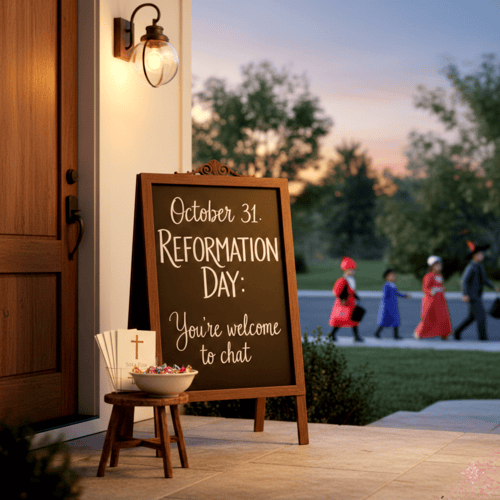Is Drinking Alcohol a Sin?
The question lands differently depending on who you ask. Some evangelical churches teach total abstinence as the safest Christian path. Others seem indifferent to excess. But the Reformed tradition offers something more nuanced—and more biblical: drinking alcohol isn’t sinful; drunkenness is.
This distinction matters far more than it might first appear.
WHAT SCRIPTURE ACTUALLY SAYS ABOUT WINE
Let’s begin with the positive testimony of Scripture.
The Bible doesn’t whisper about wine—it celebrates it. Psalm 104:14-15 describes how God provides “wine that gladdens the heart of man.” Jesus didn’t just permit wine at the wedding in Cana; he miraculously created it, transforming water into the finest vintage (John 2:1-11). And when critics accused him of being a drunkard who ate and drank too much, the charge centred on his association with sinners, not on the sinfulness of drinking itself (Matthew 11:19).
Consider too the place of wine in Israel’s covenantal life. Wine was essential to Passover, the defining celebration of God’s redemption. Jesus himself instituted the Last Supper around a cup of wine, making it perpetually central to Christian worship. Would God command his people to participate regularly in something inherently sinful? The question answers itself.
Yet this same Scripture explicitly and repeatedly condemns drunkenness. Ephesians 5:18 commands: “Do not get drunk on wine… instead be filled with the Spirit.” 1 Peter 4:3-4 groups drunkenness with idolatry, lewdness, and carousing. Proverbs 20:1 warns “wine is a mocker and beer a brawler; whoever is led astray by them is not wise.”
The pattern is unmistakable. Scripture affirms wine while condemning excess. The sin isn’t in the cup—it’s in losing control of oneself.
THE REFORMED PRINCIPLE: USE AND ABUSE
The Reformed tradition distinguishes sharply between the use and abuse of God’s good gifts. John Calvin himself, while condemning drunkenness vigorously, celebrated wine as a divine provision and drank it moderately. He understood God created wine, placed vineyards in the promised land, and pronounced it good.
The problem isn’t gluttony of wine any more than gluttony of food is inherent to eating. Proverbs 23:20-21 warns against “drunkards and gluttons”—those who lose self-control through excess. The sin lies in the loss of mastery over oneself, not in partaking of what God has made.
This reflects a broader theological truth: the fall corrupted our use of creation, not creation itself. We abuse alcohol. We abuse food. We abuse sex. But abuse doesn’t make the thing itself sinful—it makes the abuse sinful.
SELF-CONTROL AS A VIRTUE
Here’s an often-overlooked point: self-control appears as a fruit of the Spirit in Galatians 5:23. But what would self-control mean in a Christian community where nothing posed any temptation? The very presence of this virtue in Scripture suggests that Christians face genuine temptations through legitimate means.
Moderate drinking tests and demonstrates self-control. It’s a small arena where believers practice saying “enough” and meaning it. Viewed this way, the capacity to enjoy wine in moderation becomes a spiritual discipline rather than a spiritual hazard.
1 Timothy 3:2-3 requires church elders to be “not given to much wine”—which clearly implies that some wine is acceptable. And in 1 Timothy 5:23, Paul recommends wine to Timothy for his stomach problems. Would the apostle ever prescribe something intrinsically sinful as medicine?
CHRISTIAN LIBERTY AND PASTORAL WISDOM
So do we legislate where Scripture permits? Romans 14 defends believers who eat meat and drink wine against legalists who condemn them. Paul’s principle is clear: “Everything is permissible, but not everything is beneficial” (1 Corinthians 10:23-24). Wisdom, not law, governs our choices.
Yet this liberty includes the wisdom to abstain. Romans 14:21 acknowledges some believers might stumble if they see you drinking. If your drinking causes a weaker brother to fall, love demands restraint. Some Christians wisely abstain due to personal vulnerability, family history, or their particular calling as a witness. This isn’t legalism—it’s gospel-motivated love.
THE BALANCE REFORMED CHRISTIANITY OFFERS
The beauty of the Reformed approach is that it avoids both ditches. It rejects the legalism that makes drinking sinful, freeing Christians from burdensome rules Scripture doesn’t impose. But it also rejects the permissiveness that leads to excess, insisting that drunkenness remains a serious sin against sobriety and self-control.
What matters is this: Does drinking lead you toward drunkenness? Does it cloud your witness? Does it reflect gratitude for God’s gifts, or does it express something closer to rebellion? These questions of conscience, not arbitrary rules, should guide our choices.
Wine itself is a gift from God, pronounced good in creation and celebrated throughout Scripture. Drunkenness, by contrast, is incompatible with the Spirit-filled life. The difference isn’t subtle theology—it’s the difference between enjoying God’s provision with gratitude and self-control, and descending into the chaos of intoxication.
IS DRINKING ALCOHOL A SIN? RELATED FAQs
What do Reformed scholars say about alcohol? Contemporary Reformed theologians like Sinclair Ferguson and Derek Thomas affirm the historic Reformed position: drinking alcohol in moderation isn’t sinful, though drunkenness clearly is. They emphasise the Reformed confessions (like the Westminster Shorter Catechism) never list alcohol as inherently sinful, and modern Reformed churches across denominations (PCA, ECO, etc.) maintain this nuanced approach. Their consensus rejects both prohibitionism and permissiveness, insisting wisdom and self-control remain Christian virtues in how we relate to all of God’s gifts.
- How do we respond to the “addiction” argument? Reformed scholars acknowledge some people face genuine addiction and wisely abstain as a matter of personal conscience and prudence. However, they distinguish between a substance being inherently sinful and a substance being dangerous for particular individuals—much as we don’t call peanuts sinful simply because some people have severe allergies. The existence of addiction argues for wisdom and self-knowledge, not for declaring moderate use sinful for everyone.
- What about the historical “wine in the Bible” debate—was it weaker? Many scholars (including DA Carson and others in the Reformed tradition) acknowledge biblical wine was often diluted with water and sometimes weaker than modern wine, but argue this actually strengthens rather than weakens the Reformed case. If ancient believers drank diluted wine in moderation and never called it sin, modern believers following the same principle of moderation with similar or lower alcohol consumption are on even firmer biblical ground.
Do Reformed denominations have official positions on this? The Presbyterian Church in America (PCA), the Evangelical Presbyterian Church (EPC), and other Reformed bodies have no official prohibition against moderate alcohol consumption, reflecting their Reformed heritage. This stands in sharp contrast to many evangelical and fundamentalist denominations that mandate abstinence—a distinctly modern, non-Reformed position that these traditions view as overreaching beyond what Scripture teaches.
- How does the “Christian liberty” argument work here? Reformed theology emphasises Christians are freed from the law through Christ. This means we’re not bound by rules that Scripture doesn’t impose. However, this liberty isn’t libertinism—it’s constrained by love for our neighbour, concern for the weak, and the fruit of the Spirit (including self-control). So you’re free to drink moderately, but that freedom is always lived out in community and with pastoral sensitivity to others’ consciences.
- What about churches that practice total abstinence—are they unbiblical? Reformed theologians respect individual conscience and pastoral judgement in particular contexts; a church might wisely counsel abstinence due to cultural witness or community needs without declaring drinking inherently sinful. However, they would caution against teaching abstinence is biblically required or that drinking is biblically prohibited, which goes beyond what Scripture warrants and risks legalism that Paul explicitly warns against.
How does the Reformed teaching on alcohol relate to other issues of conscience (movies, music, dancing)? The same principle applies across the board: the Reformed tradition distinguishes between what Scripture forbids (sin) and what requires pastoral wisdom (prudence). Just as drinking isn’t sinful but drunkenness is, movies aren’t sinful but lust is, music isn’t sinful but idolatry is. This consistency prevents arbitrary rules and instead calls Christians to cultivate discernment, self-knowledge, and love for God and neighbour—the real marks of spiritual maturity.
IS DRINKING ALCOHOL A SIN? OUR RELATED POSTS
Editor's Pick

Is Halloween a Sin? Biblical Answers for Christian Families
Come October, and Christian families face a recurring dilemma. The doorbell rings, costumed children appear, and we ask ourselves: are [...]

Does God Truly Care About My Everyday Choices?
We believe God created the universe. We believe He orchestrated the exodus from Egypt and raised Jesus from the dead. [...]

Did Joseph Sin in Marrying an Egyptian?
It’s a troubling question: if God forbade His people from foreign alliances, why was Joseph’s marriage to an Egyptian not [...]
SUPPORT US:
Feel the Holy Spirit's gentle nudge to partner with us?
Donate Online:
Account Name: TRUTHS TO DIE FOR FOUNDATION
Account Number: 10243565459
Bank IFSC: IDFB0043391
Bank Name: IDFC FIRST BANK






